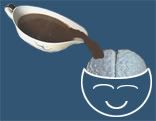You can remember everything
... Almost.
More and more, just from experience and from learning about cognitive psychology, I’ve found that we can remember much more that we thought. Even seemingly lost facts, places, faces, etc. can be found.
How can we perform such amazing feats? Through associative memory. (Those of you with some psychology background may not be too surprised.) In fact, this post is inspired by one cognitive neuroscientist who won $500,000 on Who Wants to be a Millionaire? (A highly recommended read.)
The thing here is that while some people may have heard this before, it is something else completely to understand and apply this. Personally, I use 3 methods for extracting factoids from my head.
Think about:
- Related words/ideas
- the Situation you were in when you learned it
- Insane, random ideas
Maybe that example was too metrosexual for you, maybe these other ones will make more sense.
For situational memory (or episodic memory), sometimes smelling something like a musty basement can bring back a flood of memories about playing table tennis oh-so-many years ago. In the same way, sometimes remembering where you were in the hallway in front of a washroom, when your friend mentioned magic mushrooms, the chemical muscarine (one chemical in some “magic mushrooms”) and your over-excited/under-clothed friend, can bring back memories that will help you on a pharmacology exam.
Frankly, when I’m really stuck, I like thinking of really insane, random things. If you have extra time during a test or anytime in life, I recommend this; it gets your brain moving in on a totally new path, which can get you out of that mental rut.
I’m going to use one of my dreams as an example, because I know people are getting a little tired of my arcane life sciences examples.
I had a dream last night, but when I woke up I only had the “feeling of a dream” left. Since I wanted to remember the dream, I stayed positive (important for letting those thoughts come back) and started looking around my room for associations. I looked at my headphones, and thought about a memory program I was listening to. Then I thought about books: from this I got a strong feeling that a book or books were important. Then I looked at the books in my room and saw one about the Korean language—suddenly I remembered my whole dream. (If you’re that curious as to what it was, you can ask in the comments.)
To get some free associations (to start the brain cascade), I don’t just look around wherever I am; sometimes I use a preset A-Z list of items (a peg list), body parts, random songs. It doesn’t actually matter what you choose, as long as you create some associations, and you go along with those that pull at your intuition.
I’m not saying that you will remember everything with this sort of thinking. If you are confident in yourself and your brain, however, you will remember a lot more than you previously thought possible.
Try it! Seriously! Try to connect “string” to your past, and just go with it. Appreciate all the rich associations that you make, and you’ll begin to appreciate what sorts of connections you are capable of. Inside of those connections and associations is an insanely large amount of information.
If you enjoyed these learning tips and motivational strategies, maybe you'll enjoy the other posts. Please bookmark this page (Ctrl-D) or check out the archive/categories to the right. Better yet, tell a friend! (Click the envelope below this.)
Labels: Memory, Pillars, Studying, Test-taking









0 Comments:
Post a Comment
<< Home